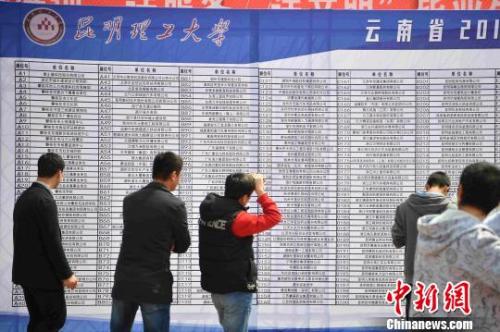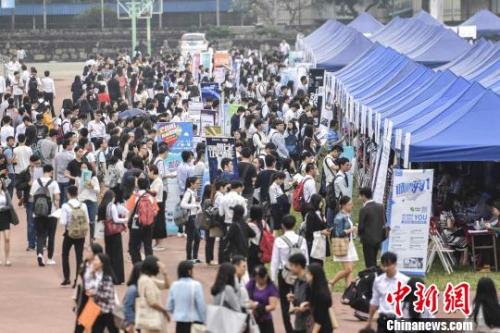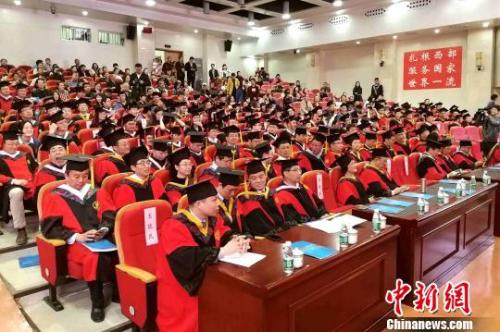Beijing, April 25th (Leng Haoyang) The graduation season is approaching, and 8.2 million college graduates will enter the society this year. For college students who are not deeply involved in the world, it is inevitable to encounter various "traps" on the road to employment. What problems should graduates pay attention to? How to start your career quickly?

On the road to employment, be alert to these "traps"
— — Employment discrimination is refurbished.
Speaking of stumbling blocks on the road to job hunting, many graduates may think of all kinds of employment discrimination. For example, boys are preferred, "double-class" college graduates are preferred, and students from a certain place are preferred.
In addition, in recent years, employment discrimination that enterprises do not consider student cadres and "returnees" in recruitment has repeatedly attracted attention.
According to the questionnaire survey conducted by China University Media Alliance for 605 fresh graduates from more than 100 universities in 2017, 75.7% of the respondents said that they had been treated unfairly when looking for a job.
In December 2017, the relevant person in charge of the Ministry of Education stressed at the 2018 national network video conference on employment and entrepreneurship of college graduates that it is necessary to strictly implement the requirements of "four prohibitions" on employment signing, resolutely oppose any form of employment discrimination, and strictly guard against illegal acts such as "training loans", job traps and pyramid schemes, and earnestly safeguard the legitimate rights and interests of graduates.

— — These contracts cannot be signed.
For graduates who finally get an offer after many interviews, they should not take it lightly when signing labor contracts. For example, the following contracts may not protect the legitimate rights and interests of graduates.
For example, after graduation, some students get a verbal commitment from the employer, and there is no written document;
For another example, the content of the contract is extremely simple, lacking the necessary details, and even the basic elements such as the name of the employer, work content and labor remuneration are incomplete;
Some contracts are obviously biased towards the employer, only emphasizing the rights and interests of the employer and the obligations of the migrant workers, and there are few provisions on the rights and interests that the migrant workers should enjoy;
In addition, some employers require workers to abide by "factory rules and regulations" and use these provisions to force workers to work overtime, making forced labor legal.

Data Map: In June 2017, a university in Sichuan released a group of graduation photo, and the graduates shouted "We graduated" at the school gate. Photo by Mo Xiaobu
— — The probation period has said
Many graduates will go through the "probation period" at the beginning of their work, so what are the rules about the probation period? Is the "provision" that no salary is paid during the probation period tenable?
How long is the probation period reasonable? According to the Labor Contract Law, if the term of the labor contract is more than three months but less than one year, the probation period shall not exceed one month; If the term of the labor contract is more than one year but less than three years, the probation period shall not exceed two months; The probation period of a labor contract with a fixed term of more than three years or without a fixed term shall not exceed six months.
In addition, according to the Administrative Measures for the Probation Period of Newly Employed Civil Servants (Trial), the probation period of newly recruited civil servants is calculated from the date of registration, and the probation period is one year.
Many graduates have also encountered the situation of not paying or paying less wages during the use period. The Labor Contract Law stipulates that the wages of workers during the probation period shall not be lower than the lowest wage of the same position in the unit or 80% of the wages agreed in the labor contract, and shall not be lower than the minimum wage standard where the employer is located.

— — There are also many "traps" for renting a house.
After graduation, what "traps" should graduates be wary of when they move out of safe and convenient dormitories and face the mixed rental market?
According to media reports, the problems of renting houses, such as defrauding the "house-looking fee" in the name of house-looking, providing false rental information to defraud the agency fee, setting up a "overlord clause" in the contract to reduce one’s obligations, and participating in intermediary services without intermediary qualifications, may all become stumbling blocks when graduates rent houses.
In this regard, the police reminded that it is necessary to find a formal housing brokerage company and carefully check the landlord’s real estate license, ID card and other information. If there is no real estate license, it must issue a purchase contract.
In addition, renters must sign a formal "House Lease Contract". In case of forced transactions and other suspected crimes, they should call 110 in time and actively provide evidence information to the police to effectively protect their rights and interests from infringement.

Data Map: On November 17, 2017, the supply and demand meeting of the 2018 college graduates in Guangdong Province kicked off in South China University of Technology. Chen Yushe
What should we do?
— — Firmly establish the awareness of safeguarding rights
In recent years, it is not uncommon that college graduates cannot protect their legitimate rights and interests because of their shallow experience. In this regard, the Ministry of Human Resources and Social Security issued the "Notice on Doing a Good Job in the Employment and Entrepreneurship of National College Graduates in 2018" in March to deploy the protection of graduates’ rights and interests.
The notice requires that publicity on the protection of employment rights and interests should be increased, and special tips, typical cases, rights protection warnings and complaint channels to prevent job-hunting traps should be published at job fairs, service halls and related websites to enhance graduates’ awareness of risk prevention and rights protection.
In view of the various problems that graduates may encounter on the road to employment, Huang Feikai, head of the student department of the School of Public Administration of the University of Electronic Science and Technology of China, suggested that in the process of job hunting, students should enhance their legal awareness and pay attention to protecting their legitimate rights and interests while observing laws and regulations.
He suggested that when signing a contract with the unit, graduates should strengthen communication with the unit and learn more about the contents of the contract, especially pay attention to the difference between the labor contract and the internship agreement, read the contents of the labor contract carefully, and clarify the terms of the probation period, salary and treatment standards and payment methods, social insurance terms and so on. Once the rights and interests are infringed, we should use legal weapons to protect our rights and interests in time.

How to start your career quickly?
— — No more "campus thinking"
Another topic that college graduates are concerned about is how to adapt to the pace of work more quickly after entering the society. How to start your career quickly?
Chu Zhaohui, a researcher at the Chinese Academy of Educational Sciences, believes that the most important thing for graduates to enter the society is to abandon their inherent thinking and constantly learn and improve themselves.
"After graduates enter the society, 80% of things need to be learned by themselves, including how to communicate with people, how to establish a sense of responsibility, how to do their own work well, and so on." Chu Zhaohui said that if graduates leave "campus thinking" after entering the society, it may become an obstacle to their career development.
In addition, a counselor of Beijing University of Posts and Telecommunications also suggested that college students can take more courses prepared by the campus employment guidance center before entering the workplace, and actively reserve professional knowledge to deepen their understanding of the company and industry. At the same time, if there is an opportunity, you can participate in the internship in advance to adapt to the pace of work as soon as possible. (End)





